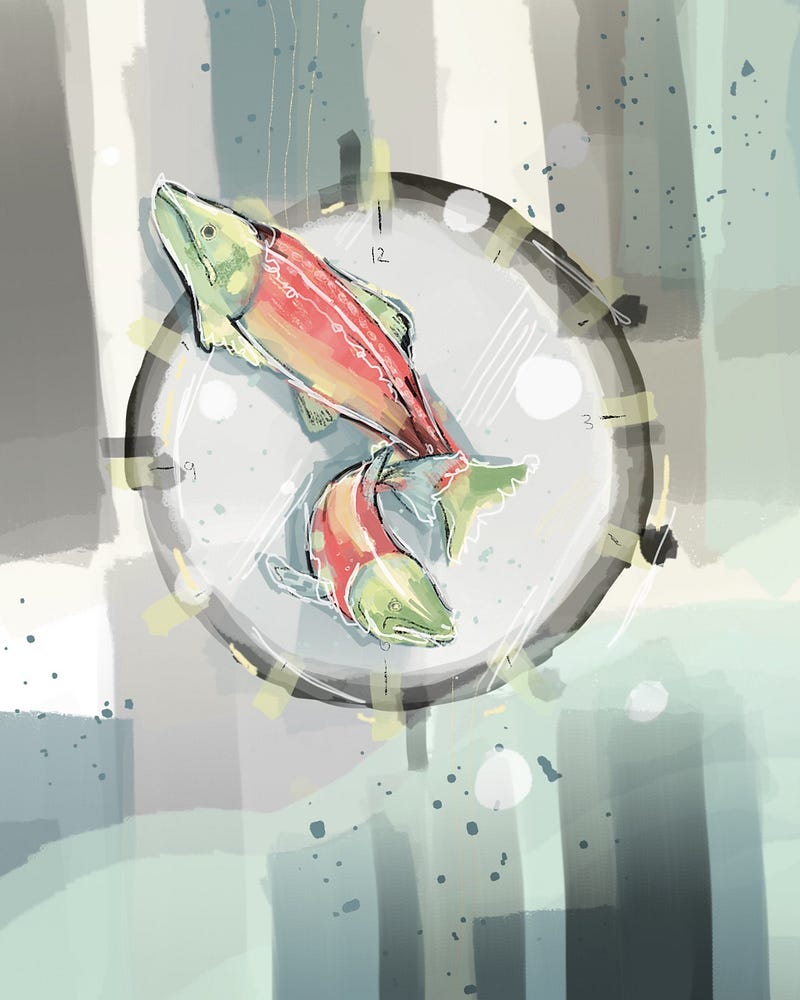Mind Tricks on the High Seas
A personal guide through the mental hardships of an Alaskan fishing season.
Story by Finn Calvert

I looked out over the Pacific Ocean off the coast of Southern Alaska. Porpoises followed our vessel as bald eagles flew overhead. Snow-capped mountains glistened underneath a summer sun. As I began to lose myself in the natural beauty, I heard footsteps beneath me.
“Get down here, you idiot!” my captain screamed.
If you consider entering the Alaskan commercial fishing scene, you’re surely prepared for the hard work that’s required. But are you also prepared for the mental abuse you’ll face? Below, you will find a guide to mentally cope with the challenges of a fishing season.
Mind Trick One: Time is a Construct
If you ever find yourself stuck on a boat with an abusive, narcissistic and highly volatile captain for six weeks, time may start to pass more slowly. This phenomenon may worsen if you work 17-hour days.
In response, I highly recommend changing how you perceive time.
“But sir!” you might retort. “Time is linear. You can’t simply change your perception of it.”
That’s where you’re wrong.
Research published by the National Center for Biotechnology Information indicates that emotion plays a huge part in how human beings perceive time. If someone is experiencing an unpleasant scenario, time slows down. When they are enjoying themselves, it speeds up.
When I realized I was going to be in hell for several weeks, my first coping mechanism was to break the season into more manageable segments.
Six weeks became 3 weeks times 2. Three weeks became 1 week times 3. This division continued until, all of a sudden, I had divided the season into segments of three or four days.
I was no longer trying to last six weeks; instead, my only goal was to make it past three days. Then three days again. And so on and so on.
While this may seem ridiculous, the results were astounding. I was originally filled with an overwhelming sense of dread, but I soon felt a sense of accomplishment when I completed the first of my imaginary segments.
Remember: on the high seas, time can be your worst enemy or your best friend.
Mind Trick Two: Everything’s a Game
Alaskan fishing has a reputation of being grueling, unforgiving work. I’d love to tell you this isn’t the case, but this sentiment is one of the only fishermen’s tales that isn’t completely exaggerated.
When your main companions are cigarettes and the only physical touch you receive is the sting of jellyfish, you may have to find creative ways to pass the time. To mitigate this unfortunate truth, I recommend creating pointless games.
Every time you unsnag a fish from the net, give yourself a point.
If you’re required to clean the boat while everyone else eats, try to make a song with the sound of your mop.
My favorite game was net laying. I developed an unhealthy obsession with laying the tightest possible figure-eights with the lead line. As my neurotic behavior grew, so did the meaning in my work.
Everyone’s game is different; everyone should find what brings them the most joy when it is so hard to come by.
At the end of the day, keep this in mind: if work is hell, find ways to make it (somewhat) fun.

Mind Trick Three: Daydream, Daydream, Daydream
When you can feel the spit from your captain’s mouth splattering on your face as he screams an inch away from you, many thoughts come to mind.
“I should scream back.”
“Wow, that breath is horrible.”
Or even, “I should push him overboard.”
While the last thought is homicidal and should obviously not be followed through on, thinking this way can be beneficial.
When I started facing abuse from my captain unrelated to anything I could improve on, I began tuning him out and daydreaming of various ways I could exact revenge.
For example, a rat chewed through a massive portion of our net when we arrived in Sitka, Alaska. The captain developed a deep-seated hatred for the rodents and could be found muttering about them under his breath for weeks afterward.
In response, my crewmates and I devised a plan to release dozens of rats into his residence when we returned to Seattle, Washington.
Whenever he would hurl insults my way, instead of internalizing them, I would have to stop myself from laughing as I pictured him returning to find his apartment ransacked by his foes.
While I never followed through on any of my schemes, separating my headspace from my bleak reality offered the respite necessary to finish the season.
Never forget: just because you’re stuck on a boat in the middle of the Pacific Ocean doesn’t mean your mind has to be.
Hopefully, this guide will prepare prospective fishers for the mental hardships they may face while in Alaska.
While many have chronicled the physical hardships of Alaskan fishing, in my experience, the mental side was much more challenging.
Without these tricks, I likely would not have lasted the season. That being said, they had adverse effects.
When I returned home, I found it incredibly difficult to be present. I would relive the games I made almost every night in bed. Loud, group settings were overwhelming. It took months to restore my mental health.
In order to combat this, I had to reverse many of my formerly helpful tactics. I made a concerted effort to be mindful of my surroundings. Instead of having to gamify my activities, I chose to participate in hobbies and work I genuinely enjoyed. Finally, I allowed my perception of time to return to a more “normal” state.
By doing the opposite of what had helped me through the summer in Alaska, I was able to recover.
So, my final tip for prospective fishers is: while mind tricks on the high seas may get you through the season, leave them behind when you return to dry land.